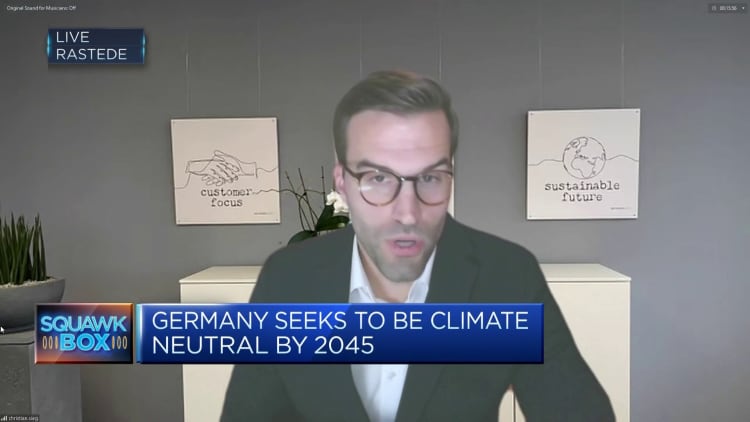Federal Chancellor Olaf Scholz (SPD, rl), Robert Habeck (Alliance 90/Greens), Federal Minister for Economic Affairs and Climate Protection, and Christian Lindner (FDP), Federal Minister for Finance, follow the debate at the start of weekly budget.
Michael Kappeler | Image Alliance | Getty Images
There was little good news for the German economy. And the latest economic data hasn’t done much to change that.
Some key data for 2023, namely factory orders, exports and industrial production, were released last week and pointed to a weak end to the year that has seen questions resurface about whether Germany is “the man sick man of Europe”.
“The data confirms that German industry is still in recession,” Holger Schmieding, chief economist at Berenberg Bank, told CNBC.
Industrial production fell 1.6% in December on a monthly basis, and in 2023 overall fell 1.5% from a year earlier. Exports – a cornerstone of the German economy – fell 4.6% in December and 1.4%, or 1.562 trillion euros ($1.68 trillion), over the year.
Meanwhile, data on factory orders looked promising at first glance as it reflected an increase of 8.9% in December compared to November.
But this growth is “no cause for comfort,” Franziska Palmas, senior European economist at Capital Economics, told CNBC, explaining that it is thanks to several large-scale orders, which tend to be volatile. “Orders, excluding large-scale orders, have actually fallen to post-pandemic lows,” she added.
In 2023 as a whole, compared to the previous year, orders to factories decreased by 5.9%.
While this “substantial” December data does not yet suggest that recovery is in sight, the most recent Purchasing Managers’ Index report indicates that the worst may be over soon in the manufacturing sector, Schmieding said.

“Although at 45.5 it is still below the 50 line that divides growth from contraction, it has reached an 11-month high,” he noted.
Even so, economic growth is unlikely to be imminent, Erik-Jan van Harn, macro strategist for global economics and markets at Rabobank, told CNBC.
“We are still not far from the kind of activity in German industry that we saw before the pandemic,” he explained. “We still expect a modest contraction in the first quarter, but it will likely be less severe than in 23Q4,” van Harn said. He therefore expects growth to pick up slightly, but believes full-year growth will be flat.
Others are even more pessimistic about the German economy.
“We remain true to our forecast that the German economy will contract by 0.3% in 2024 as a whole,” Commerzbank chief economist Jörg Krämer told CNBC.
This would be broadly in line with the performance of the German economy in 2023, when it contracted by 0.3% year-on-year, according to data published last month by the Federal Statistics Office. The data also showed a 0.3% decline in gross domestic product in the fourth quarter, but Germany still managed to avoid a technical recession, characterized by two consecutive quarters of negative growth.
This is because the statistics office found that the third quarter of 2023 saw stagnation rather than contraction. But if the economy were to contract as expected in the first three months of 2024, Germany would effectively fall into recession.
“Companies simply have too much to digest: global rate hikes, high energy prices, less tailwind from China and an erosion of Germany as a business location,” Krämer explained, addressing the reasons for the downturn.
Some of these obstacles could also play a key role in weakening export data, Rabobank’s van Harn pointed out. Factors such as cheap energy from Russia, strong demand from China and increased global trade have supported German exports for decades, “but now they are faltering,” she said.
Looking beyond purely economic, national and international politics could also pose a risk to the country’s economy, experts say.

Germany’s coalition government is under pressure after experiencing a budget crisis following the Constitutional Court’s decision that it was illegal to reallocate unused debt incurred during the pandemic to current budget plans.
This has left a €60 billion hole in the coalition’s budget plans, and as the funds have been earmarked for years to come, the crisis is likely to return at the end of the year, when planning for the 2025 budget begins .
Voter satisfaction with the government is also low, with the opposition CDU party currently leading in the polls and followed in second place by Germany’s far-right party, the AfD. However, support for the latter has declined in recent weeks due to the protests against the far right that have swept the country, with hundreds of thousands of Germans taking to the streets.
Elsewhere too, the US election could make things more difficult, Schmieding suggested.
“Trade war threats from Trump could have a significant negative effect for Germany,” he said, but this obviously depends on the outcome of the elections and may not fully manifest itself until 2025, he noted.